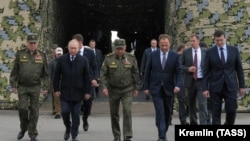On March 29, Russia's top military commanders, including Defense Minister Sergei Shoigu and Chief of the General Staff Valery Gerasimov, held a press conference in Moscow. Shoigu provided an assessment of Russia's performance in the war against Ukraine.
Both Shoigu and Gerasimov have reportedly been absent from public view for several weeks, prompting rumors that they had fallen out with President Vladimir Putin.
On March 30, the White House, citing intelligence, said that Putin has been misinformed about the war in Ukraine, and that "his senior advisers are afraid to tell him the truth."
"According to declassified U.S. intelligence, the misinformation has created mistrust and stoked tensions between Mr. Putin and his defense minister, Sergei Shoigu," The New York Times reported.
Whatever the case, the information Shoigu provided at the March 29 press briefing was neither accurate nor factual.
"On the whole, the main goals of the first stage of the operation are completed," Shoigu claimed.
The claim is misleading. Shoigu painted an exaggerated and partly false picture of Russia's successes in the war in Ukraine while not mentioning its own losses.
Independent observers and Western governments alike are skeptical of the claims about the Russian army's achievements. Ukraine, in fact, not only has held off the Russian offensive but has also counterattacked and reclaimed parts of the country that Russian forces took during the first weeks of the invasion.
"The Russians have not achieved any of the strategic objectives that they set out to — or certainly not without loss," a U.S. Defense Department spokesperson told reporters on March 30, adding that Ukraine is defending parts of the country "very smartly, very nimbly, very creatively."
"We have seen indications that the Ukrainians are going a bit more on the offensive now," the Pentagon spokesperson said.
British intelligence concurs. On March 30, the Huffington Post quoted Jeremy Fleming, the head of Britain's Government Communications Headquarters intelligence agency, as saying that Russian troops in Ukraine are "short of weapons and morale" and even undermining their own offensive by rejecting orders and destroying their own equipment, including aircraft.
Western intelligence officials also describe Russian losses as "disproportionally high." In four weeks of combat, Russia may have lost 25% of its initial attacking force, the Washington D.C.-based Center for Strategic and International Studies reported in a March 31 assessment.
NATO estimates that Russia has lost between 7,000 and 15,000 soldiers
"Wounded who cannot rapidly return to duty generally number about twice the number of dead. That would mean that Russia has lost between 21,000 and 45,000 troops in four weeks of conflict," CSIS said.
To the Russian military command's embarrassment, the harshest criticism of its military's performance came not from the Western intelligence agencies or even from Ukraine, but from one of their own — the GRU (Russian military intelligence) officer Igor Girkin, who is also known by his nom de guerre, Igor Strelkov. In 2014, Girkin was deployed to eastern Ukraine to organize and command the Russia-backed forces that started the initial war against Kyiv in Ukraine's Donbas and Luhansk regions.
Girkin is one of the three Russians whom Dutch investigators have accused of shooting down Malaysia's MH17 passenger airliner in 2014, killing all 298 people on board.
Girkin told Russia's ultraconservative ROI TV on March 29 that if the Russian forces under the leadership of the "plywood general Shoigu" and "our so-called president Putin" continued conducting the war the way they did during the first "wasted golden month," then "we will see the blue-yellow piece of cloth of so-called Ukraine erected over Moscow."
Russian military successes are "nonexistent," Girkin said, adding that the Russian military controls only "narrow elongated appendixes along the roads and road junctions leading to Kyiv," which are a "perfect target" for Ukrainian military commanders, who are "much smarter than ours."
"Let me be a traitor to the motherland, but I will tell the truth," Girkin said
During the March 29 press briefing, Shoigu also claimed that the "Ukrainian air force and air defense systems are practically destroyed" and that the "country's naval forces have ceased to exist."
These claims are also misleading and partly false.
"Ukraine did not really have a functional 'navy' to begin with, mostly coastal patrol craft and a few larger research, minesweeper-layer, and 'intelligence' ships. It could be described as a stronger coast guard than a true navy," Allan Stam, a University of Virginia professor and military affairs expert, told Polygraph.info.
In regard to the navy, however, Stam noted that "Shoigu's statement is mostly correct. Ukraine's navy is functionally destroyed. It cannot threaten the Russian navy outside of continued mining of the Black Sea coastal ports. The Sea of Azov is entirely controlled by the Russians."
According to the Dutch website Oryx, which publishes a database of verified losses on both sides in the war in Ukraine, the Russian navy lost three vessels: Two were damaged, and one was destroyed. Ukraine's navy lost 14 vessels: Two were destroyed, and 12 were captured by the Russians.
The situation with the air force is an entirely different matter, and Shoigu's claims that Russia controls the skies over Ukraine and has destroyed Ukraine's air force are simply false.
According to Oryx, Russia has lost 73 aircraft, including 16 combat jets and 38 helicopters. Sixty-one were destroyed, six were captured by Ukrainian troops, four were damaged, two were abandoned.
Ukrainian air force has lost 26 aircraft, of which 23 were destroyed, one damaged and two captured by the Russians.
The airspace over Ukraine "remains contested," a U.S. defense official told the Voice of America's national defense correspondent Jeff Seldin on March 31.





